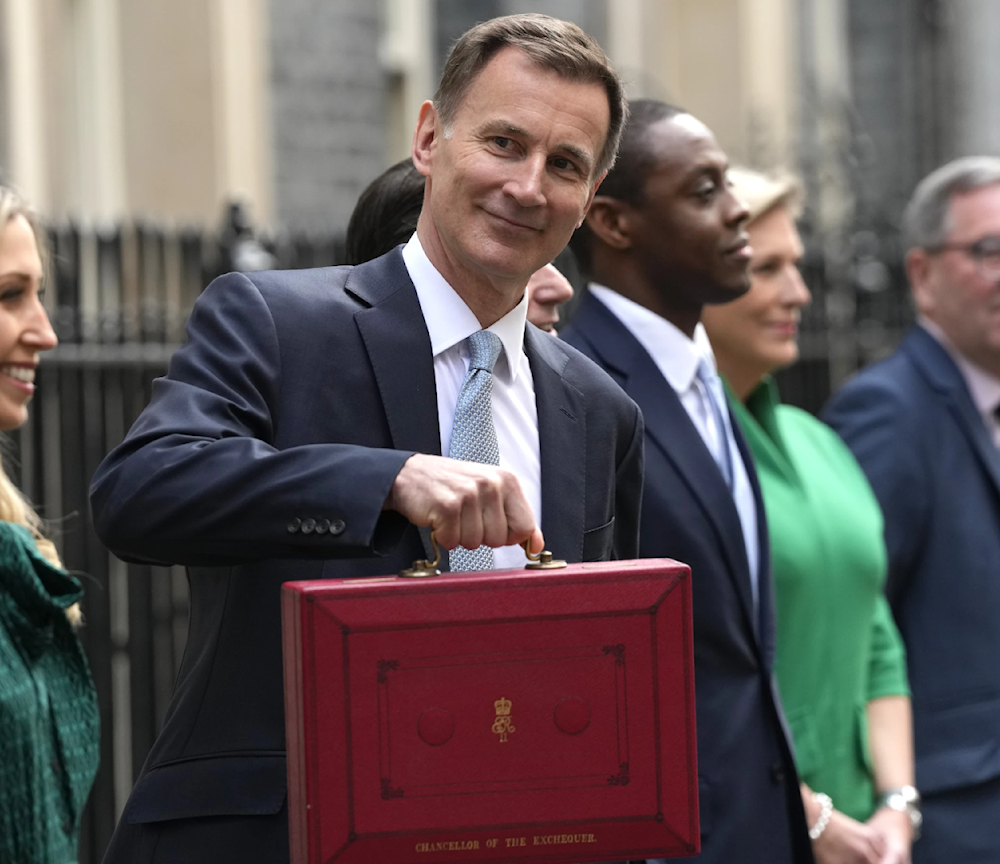UK gov't borrows more in February with highest debt since 1960s
With only a month to go in the fiscal year 2023-24, the ONS reported that the budget deficit for the year thus far was $134 billion, down 4.1% from the first 11 months of the same time a year before.
-

Britain's Chancellor of the Exchequer Jeremy Hunt holds his traditional red ministerial box as he leaves 11 Downing Street for the House of Commons to deliver the Budget in London on March 6, 2024. (AP)
According to The Guardian, Jeremy Hunt has received gloomy news from the public finances as government borrowing exceeded expectations in February, putting the national debt at its highest level since the 1960s.
The Office for National Statistics (ONS) reported that public sector net borrowing was $10.6 billion in February, $4.32 billion less than the same month a year ago. However, it was greater than any analyst projected according to a Reuters survey, which forecasted a $7.6 billion deficit.
According to a top statistician at the ONS, Jessica Barnaby, “This was the fourth consecutive month in which borrowing was lower than in the same month a year ago, with growth in tax receipts exceeding growth in spending. Relative to the size of our economy, debt remains at levels last seen in the early 1960s.”
With only a month to go in the fiscal year 2023-24, the ONS reported that the budget deficit for the year thus far was $134 billion, down 4.1% from the first 11 months of the same time a year before.
Yet, February's unusually high level of borrowing may jeopardize the Office for Budget Responsibility's predictions for a $144 billion deficit in 2023-24, which were included in this month's budget.
According to Ruth Gregory, the chief UK economist at Capital Economics, the "disappointing" borrowing statistics indicated that the OBR prediction was already "too optimistic."
“But this may not prevent the government from squeezing in another pre-election tax-cutting fiscal event later this year,” Gregory noted.
“But a fiscal tightening will probably still be required beyond 2024. So anything the chancellor gives away will probably be taken away once the election is over.”
The most recent numbers revealed that central government collections increased by $8 billion in revenue from income tax, company tax, and VAT when compared to the same month a year before.
Even after Hunt's 2p drop in national insurance announced in last year's autumn statement, which went into effect in January, the numbers for February revealed a $508 million increase in income from social security contributions compared to the same month a year before.
However, the increase in tax revenue was offset by the effect of inflation on spending by the government.
The Treasury's chief secretary, Laura Trott. claimed the economy was "turning a corner" as inflation fell and earnings rose.
She asserted that although the government did well by helping pay people's energy bills "We can’t leave future generations to pick up the tab."

 3 Min Read
3 Min Read








